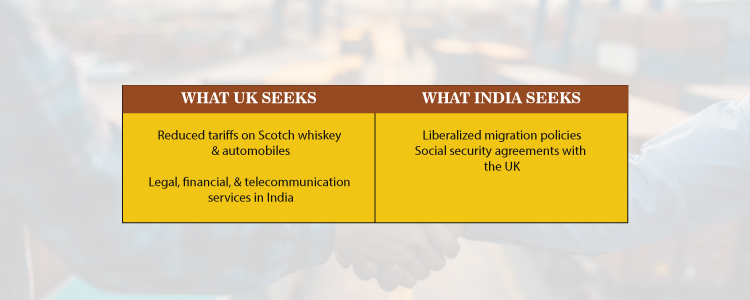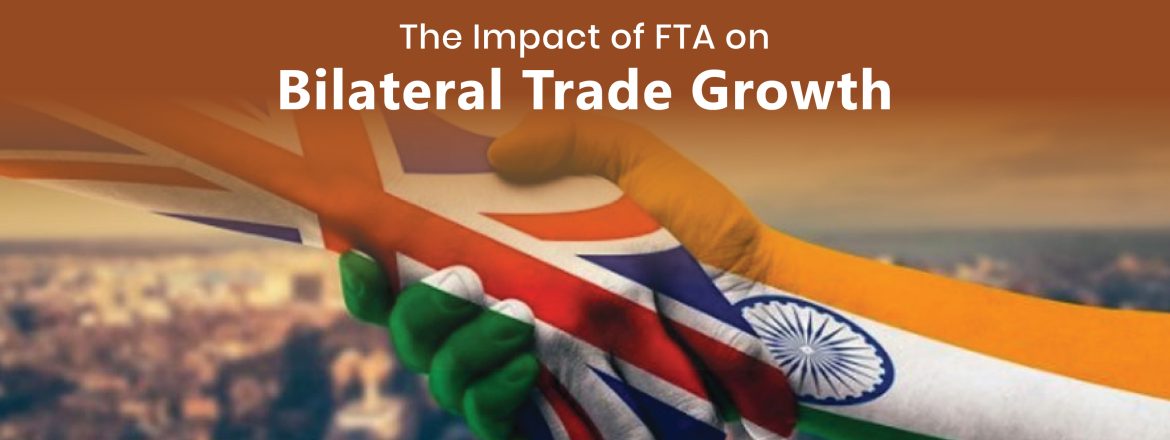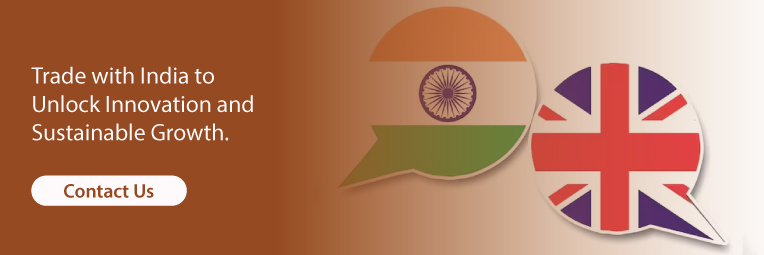India-UK Free Trade Agreement 2025: What It Means for Bilateral Trade Growth
What sparked the India-UK Free Trade Agreement (FTA) in 2022 was Brexit, following which, the two nations committed to a stronger bilateral trade. Over the years, intense negotiations took place starting with the ‘Enhanced Trade Partnership’ with 14 rigorous rounds unfolding till 2024. These were in terms of automobiles, whiskey, and textiles along with the UK’s core focus on IPR and investment security. Now let us see in detail how the economic futures of both nations can be transformed with this historic trade pact.
India UK Free Trade Agreement in 2025
A free trade agreement allows two countries to trade goods and services across international waters with minimal or zero government quotas, tariffs, and subsidies. In February 2025, India and the UK jointly declared that the FTA negotiations will resume which has the potential double or even triple bilateral trade to reach $40 to $60 billion in a decade. But how? Read on.

What India and UK Seeks - Highlights
India wishes to have greater market access for its highly skilled and proficient professionals and goods including pharmaceuticals and textiles. The UK, on the other hand, seeks lower taxes on electric vehicles and Scotch whiskey along with higher opportunities for UK services in India. Below are other key elements of the India UK economic relations.
Tariff Reduction
Indian products like auto components, leather goods, and textiles will become more affordable in the UK. Similarly, high-end electronics, whiskey, and automobiles exported by the UK will have to pay lower duties to make them more attractive to Indians. Altogether, this means more choices for consumers at competitive prices due to such global trade relations.
Services Sector Boost
Indian IT and healthcare firms can expand their operations in the UK and gain access into the markets without extensive tariffs and regulations. Additionally, while UK universities are able to attract more Indian students, Indian professionals like engineers and architects will find it easier to work in the UK.
IPR Framework
The FTA will create a framework to encourage innovation, prevent piracy, and protect the patents of both UK and Indian businesses. This will cover British firms in fashion, entertainment, and pharmaceuticals and Indian startups, SMEs, and tech firms in the UK. For consumers, this means core authenticity in software and medicines.
Ease of Business
Paperwork and licensing are complicated and trade restrictions are on the rise. The FTA aims to remove these barriers to simplify the act of doing business. Therefore, there would be greater transparency to navigate international import export trade policies, custom procedures for minimal shipment expenses and delays, and quicker approvals for businesses in both India and the UK.
These are the basics of the India-UK free trade agreement which is a sheet win-win situation for businesses, investors and consumers alike. In fact, it is being anticipated that the FTA will have a considerate impact on global trade patterns by motivating others to establish and leverage analogous collaborative strength between developed and developing nations. This could shift the trade focus towards Asia, especially India.
Now let us see what the FTA means for bilateral trade.
How Does the India-UK Free Trade Agreement Impact Bilateral Trade Growth?
Bilateral trade had surpassed $38 billion in 2023 and India has emerged as the UK’s 4th largest export market as of May 2024. The FTA is expected to push these figures notably higher by fostering impressive investment opportunities and eliminating trade restrictions. Read on for more details on this.
Growth in Trade Volumes
There would be a significant reduction in taxes and a growing trend in economic cooperation. For instance, post the FTA by the end of 2025, bilateral trade is expected to grow at 10-15% CAGR which is expected to touch $64 to $70 billion by 2030. Key sectors that will drive this significant growth include textiles and apparels, automobiles and engineering products, tech and digital services, and pharmaceuticals, clinical research and biotech investments.
As of early December 2024, the UK invested £33.5 million in electric vehicle space. In Feb 2025, the UK-India partnership was strengthened with £100 million investment deals in the tech and life science sectors. These will continue to show a positive momentum after the FTA which will be finalized by the end of 2025. A greater certainty in trade policies and investments, higher collaborations in innovation and finance, and lower trade barriers via reduced tariffs are expected.
Additionally, FTA will lower bureaucratic delays, simplify documentation, ensure quicker clearance of goods, ensure investment security, and streamline operations.
Strategic Partnerships
The FTA aligns with the UK-India Roadmap 2030 which is a long-term vision of both nations to improve innovation, investment, and general trade ties. Further, it will also offer India greater access to Commonwealth and European markets through the UK. Below are other significant partnerships:
Workforce Partnership: This would be between India’s IT professionals and the UK market since they would enjoy better access. Further, easier work visa norms for Indians in the IT, healthcare, engineering, biotechnology, finance sectors would be easier which will help the UK fill talent gaps in these areas.
Education & Research Partnership: Cross-border movement will be made safe and easier for individuals in the academic field like researchers and students for better knowledge exchange. There would further be greater collaboration between the UK and Indian universities around artificial intelligence, STEM, and business studies to strengthen academics in both nations.
Technology Partnership: FTA will foster joint R&D in clean energy, cybersecurity, fintech, and AI. Startups, SMEs, and tech enterprises will additionally benefit from cross-border investments in digital infrastructure. The UK will especially support India’s Digital Public Infrastructure (DPI) to supercharge digital governance and financial inclusion.
Expansion of Sectors
1. Favourable regulations for Indian firms when expanding in the UK.
2. Smooth entry of UK foods and dairy into Indian supermarkets.
3. Rise in UK’s investments in India’s solar, wind, and green hydrogen energies.
4. Cross border activities in banking, insurance, and general wealth management.
5. Lower taxes on Indian generic drugs to make it affordable for the UK.
Altogether, the UK and India are expected to unlock huge economic potential by improving rules and regulations around these sectors. This will further be powered by innovation and new job opportunities in both the nations.
Conclusion
The India-UK Free Trade Agreement (FTA) will act like a transformative catalyst to redefine the meaning of bilateral investments and trade for the world. By removing tariff barriers, the agreement will unlock new streams for economic expansion with synergies across various industries and sectors including automobiles, pharmaceuticals, and high-end manufacturing.
The FTA is much beyond just a commercial pact, it serves as a strategic partnership to fulfil the shared aspirations of two nations. If executed properly, it has the potential to propel the British-Indo ties into an era of unprecedented resilience and prosperity. India, especially, will enjoy a highly strengthened global trade position with a diversified export market, supply chain optimization, and a significant advantage over Bangladesh, China, and Vietnam.
Therefore, it is a good idea to partner with trusted and reliable sourcing and procurement companies like Inductus Global to fulfil your trading needs from India, a nation that is emerging as a key player in international commerce.










